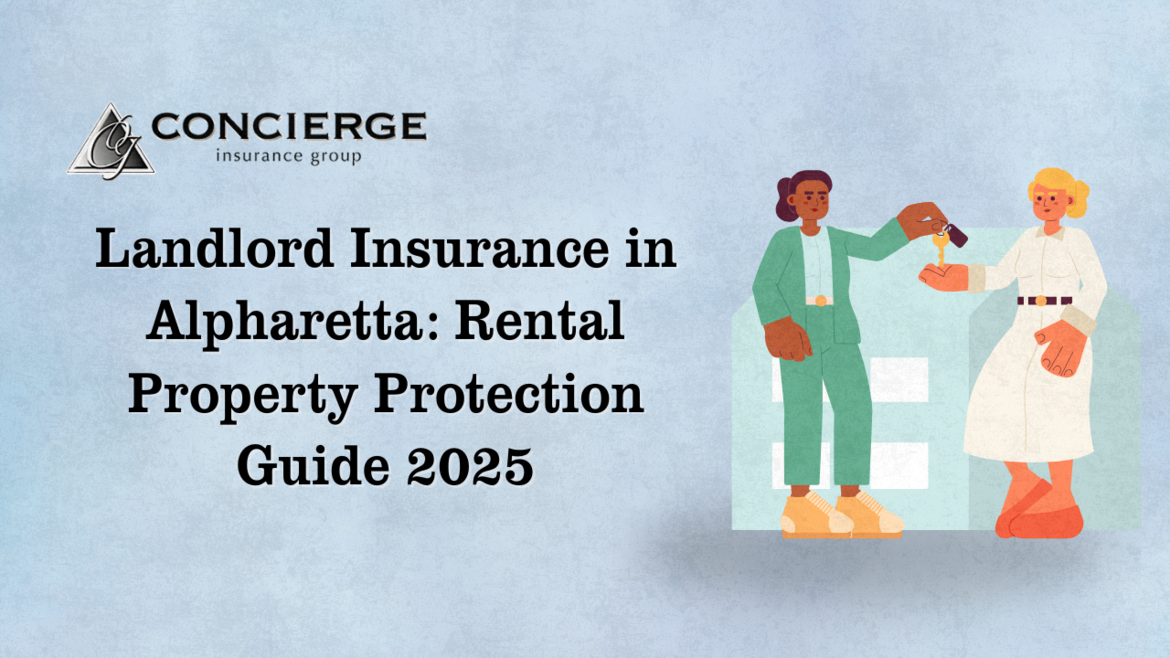
Is your Alpharetta rental property truly protected from the unexpected?
Are you aware of the costly risks that can threaten your investment—from storm damage and tenant mishaps to legal claims and lost income?
In this guide, you’ll learn exactly what landlord insurance covers in Georgia, why it’s essential for rental property owners, and how to optimize your policy in 2025 to reduce costs and protect your bottom line.
We’ll explore:
-
What landlord insurance covers (and what it doesn’t)
-
Key risks specific to Alpharetta and Georgia landlords
-
What it costs in 2025 and how to lower your premiums
-
Legal and compliance updates landlords need to know
-
Tax benefits and insurance best practices
What Is Landlord Insurance and Why Do You Need It?
Landlord insurance is not the same as homeowners insurance. While the latter covers owner-occupied homes, landlord insurance is designed for rental properties and includes protections tailored to the unique risks of renting.
In Georgia—where approximately 35% of households are renters—landlord insurance is a critical layer of protection that includes:
-
Property damage protection for the structure and detached buildings
-
Liability coverage in case a tenant or visitor is injured
-
Loss of rental income if the property becomes uninhabitable due to a covered event
In a high-demand area like Alpharetta, where property values are rising and rental competition is fierce, insurance ensures your financial future is secured.
Key Components of Landlord Insurance in Georgia
1. Property Damage Protection
Landlord insurance protects your property's physical structure from perils like:
-
Fire
-
Hail
-
Wind and storms
-
Vandalism
This also covers other structures like garages, fences, and sheds. With Georgia experiencing 129 major climate disasters over the past 44 years, including hurricanes and floods, this coverage is especially important.
2. Liability Coverage
If someone is injured on your property, liability insurance covers:
-
Medical bills
-
Legal fees
-
Court judgments
Most landlord policies include $1 million in liability coverage—a reflection of the heightened risk landlords face compared to homeowners.
3. Loss of Rental Income
Should your property become uninhabitable (due to fire, storm damage, etc.), this coverage replaces your lost rental income, ensuring stable cash flow during repairs.
Georgia-Specific Coverage Considerations
Weather-Related Risks
Standard landlord policies do not include flood damage. Given Georgia’s history—such as the 2009 Atlanta floods—separate flood insurance is a must, especially in flood-prone areas.
Tenant-Related Incidents
Your policy may cover accidental damage by tenants (e.g., kitchen fire), but not:
-
Intentional vandalism (often requires add-ons)
-
Normal wear and tear (maintenance issue)
What Does Landlord Insurance Cost in Alpharetta in 2025?
Average Pricing in Georgia
Landlord insurance is 15–25% more expensive than homeowners insurance. Based on Georgia’s average of $2,302/year for homeowners, landlord policies average around $2,877/year.
National benchmarks:
-
Single-family homes: $1,200–$1,500 annually
-
Condos: $700–$1,200 annually
-
Small multi-family (2–4 units): $1,500–$2,500
-
Larger multi-family (5+ units): $2,500+
Factors That Affect Alpharetta Insurance Rates
-
Location specifics: proximity to Atlanta, local crime, fire response times
-
Property characteristics: age, condition, construction, safety features
-
Claims history: fewer past claims = lower premiums
How to Lower Your Premium
You can reduce your premium with:
-
Safety devices: alarms, fire sprinklers, motion lights
-
Policy bundling: insure multiple properties with the same provider
-
Higher deductibles: trade higher out-of-pocket costs for lower rates
-
Annual payment discounts
-
Storm mitigation upgrades: wind-resistant roofing, impact windows
Legal & Compliance Requirements in 2025
Do You Have to Buy Landlord Insurance?
Not by law—but mortgage lenders require it, and it's essential for protecting your investment.
New Georgia Laws That Affect Landlords
-
Safe at Home Act: Requires landlords to fix safety and health hazards
-
Security Deposit Cap: Limited to two months’ rent
-
Eviction Rule: 3 business days’ notice before filing for non-payment
Flood Disclosure Rule
If a property has flooded 3+ times in the past 5 years, written disclosure is required before lease signing.
Can You Require Renters Insurance?
Yes. Many Alpharetta landlords require:
-
$100,000 liability
-
$10,000 personal property coverage
-
Landlord named as “interested party”
The Claims Process in Georgia
What to Expect in a Claim
-
Initial response: Within 15 days of notice
-
Investigation: Completed within 30 days
-
Decision: Approved or denied within 60 days
-
Payment: Sent within 60 days of approval
Documents You’ll Need
-
Immediate written notice to insurer
-
Police report (for theft or vandalism)
-
Lightning loss statement
-
Photos and repair estimates
-
Receipts and contractor invoices
What If the Insurer Doesn’t Cooperate?
Georgia’s Unfair Claims Settlement Practices Act protects you. You can file a complaint with the Georgia Department of Insurance for delays or bad faith denials.
Tax Benefits for Georgia Landlords
Your Policy Is a Write-Off
Insurance premiums are 100% tax-deductible. That includes:
-
Basic landlord insurance
-
Flood and umbrella policies
-
Workers' comp for on-site staff
Example: If you’re in the 24% tax bracket and pay $1,200/year in premiums, you’ll save $288 on your taxes.
More Deductible Expenses
-
Property maintenance and repairs
-
Depreciation (27.5 years for residential rentals)
-
Mortgage interest
-
Property taxes (subject to limits)
-
Legal, accounting, and property management fees
Best Practices for Alpharetta Landlords
Coverage Optimization Tips
-
Insure at 100% of replacement value (minimum 80%)
-
Choose $1M+ liability limits for high-risk features (e.g., pools)
Preventive Risk Management
-
Routine maintenance: HVAC, electrical, plumbing, roof
-
Tenant screening: Background, credit, rental history checks
-
Emergency prep: Flood/storm plans and tenant communications
Partner With the Right Professionals
-
Local agents who understand Alpharetta’s specific risks
-
Property managers who reduce claims through better upkeep and tenant relations
Conclusion: Why Alpharetta Landlords Can’t Afford to Skip Insurance
Owning rental property in Alpharetta offers long-term financial gains—but only if your investment is protected. Landlord insurance is a small monthly cost that guards you from devastating losses related to weather, liability claims, and lost income.
If you’re paying about $100–$125 per month, you’re not just buying peace of mind—you’re also unlocking tax savings and discount opportunities that make your policy even more valuable.
Now that you know what landlord insurance in Georgia involves and how to protect your rental income in 2025, your next step is to speak with a local agent about customizing a policy for your Alpharetta properties.
With the right coverage in place, you’ll sleep better at night—and grow your rental portfolio with confidence.

